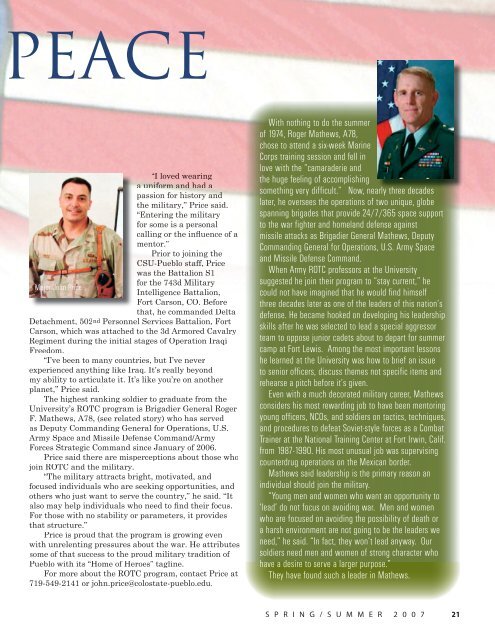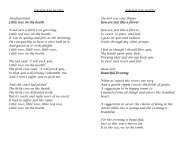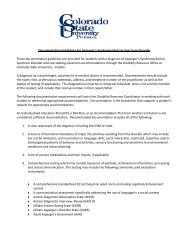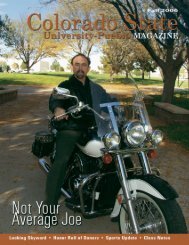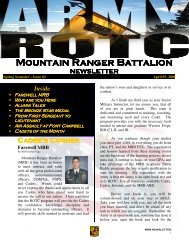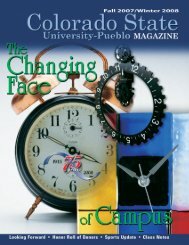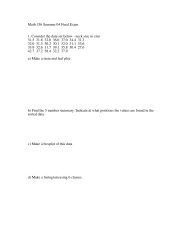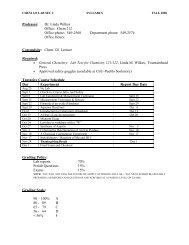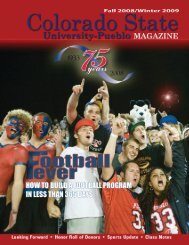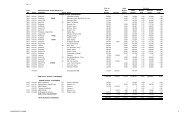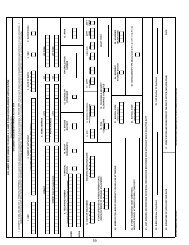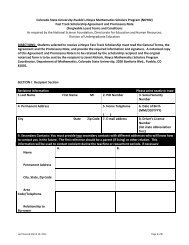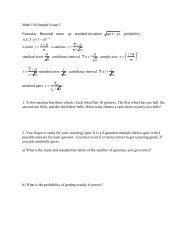Colorado State University-Pueblo MAGAZINE Spring/Summer 2007
Colorado State University-Pueblo MAGAZINE Spring/Summer 2007
Colorado State University-Pueblo MAGAZINE Spring/Summer 2007
Create successful ePaper yourself
Turn your PDF publications into a flip-book with our unique Google optimized e-Paper software.
Peace<br />
“I loved wearing<br />
a uniform and had a<br />
passion for history and<br />
the military,” Price said.<br />
“Entering the military<br />
for some is a personal<br />
calling or the influence of a<br />
mentor.”<br />
Prior to joining the<br />
CSU-<strong>Pueblo</strong> staff, Price<br />
was the Battalion S1<br />
for the 743d Military<br />
Major John Price<br />
Intelligence Battalion,<br />
Fort Carson, CO. Before<br />
that, he commanded Delta<br />
Detachment, 502nd Personnel Services Battalion, Fort<br />
Carson, which was attached to the 3d Armored Cavalry<br />
Regiment during the initial stages of Operation Iraqi<br />
Freedom.<br />
“I’ve been to many countries, but I’ve never<br />
experienced anything like Iraq. It’s really beyond<br />
my ability to articulate it. It’s like you’re on another<br />
planet,” Price said.<br />
The highest ranking soldier to graduate from the<br />
<strong>University</strong>’s ROTC program is Brigadier General Roger<br />
F. Mathews, A78, (see related story) who has served<br />
as Deputy Commanding General for Operations, U.S.<br />
Army Space and Missile Defense Command/Army<br />
Forces Strategic Command since January of 2006.<br />
Price said there are misperceptions about those who<br />
join ROTC and the military.<br />
“The military attracts bright, motivated, and<br />
focused individuals who are seeking opportunities, and<br />
others who just want to serve the country,” he said. “It<br />
also may help individuals who need to find their focus.<br />
For those with no stability or parameters, it provides<br />
that structure.”<br />
Price is proud that the program is growing even<br />
with unrelenting pressures about the war. He attributes<br />
some of that success to the proud military tradition of<br />
<strong>Pueblo</strong> with its “Home of Heroes” tagline.<br />
For more about the ROTC program, contact Price at<br />
719-549-2141 or john.price@colostate-pueblo.edu.<br />
With nothing to do the summer<br />
of 1974, Roger Mathews, A78,<br />
chose to attend a six-week Marine<br />
Corps training session and fell in<br />
love with the “camaraderie and<br />
the huge feeling of accomplishing<br />
something very diffi cult.” Now, nearly three decades<br />
later, he oversees the operations of two unique, globe<br />
spanning brigades that provide 24/7/365 space support<br />
to the war fi ghter and homeland defense against<br />
missile attacks as Brigadier General Mathews, Deputy<br />
Commanding General for Operations, U.S. Army Space<br />
and Missile Defense Command.<br />
When Army ROTC professors at the <strong>University</strong><br />
suggested he join their program to “stay current,” he<br />
could not have imagined that he would fi nd himself<br />
three decades later as one of the leaders of this nation’s<br />
defense. He became hooked on developing his leadership<br />
skills after he was selected to lead a special aggressor<br />
team to oppose junior cadets about to depart for summer<br />
camp at Fort Lewis. Among the most important lessons<br />
he learned at the <strong>University</strong> was how to brief an issue<br />
to senior offi cers, discuss themes not specifi c items and<br />
rehearse a pitch before it’s given.<br />
Even with a much decorated military career, Mathews<br />
considers his most rewarding job to have been mentoring<br />
young offi cers, NCOs, and soldiers on tactics, techniques,<br />
and procedures to defeat Soviet-style forces as a Combat<br />
Trainer at the National Training Center at Fort Irwin, Calif.<br />
from 1987-1990. His most unusual job was supervising<br />
counterdrug operations on the Mexican border.<br />
Mathews said leadership is the primary reason an<br />
individual should join the military.<br />
“Young men and women who want an opportunity to<br />
‘lead’ do not focus on avoiding war. Men and women<br />
who are focused on avoiding the possibility of death or<br />
a harsh environment are not going to be the leaders we<br />
need,” he said. “In fact, they won’t lead anyway. Our<br />
soldiers need men and women of strong character who<br />
have a desire to serve a larger purpose.”<br />
They have found such a leader in Mathews.<br />
S P R I N G / S U M M E R 2 0 0 7 21


